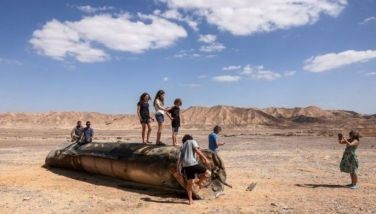Head of Filipino sultanate that invaded Malaysian state dies
MANILA — The leader of a sultanate in the southern Philippines that staged a 2013 invasion of a bustling Malaysian state and sparked a deadly security crisis has died of kidney failure, his family and followers said yesterday.
Sultan Esmail Kiram II died at age 76 late Saturday at a hospital in southern Zamboanga city and left an order for his followers to pursue a claim to Sabah state in neighboring Malaysia, according to sultanate spokesman Abraham Idjirani.
"One of his instructions was the pursuit of the Sabah claim through peaceful means for the welfare of the Filipino people," Idjirani said.
Although largely dismissed as a vestige from a bygone era, Kiram's Muslim sultanate, based in the southern Philippine province of Sulu, stirred up a crisis between Malaysia and the Philippines when his younger brother and about 200 followers, dozens of them armed, barged into Sabah's coastal village of Lahad Datu in February 2013.
Malaysia responded by sending troops and launching airstrikes in weeks of sporadic fighting that killed dozens of people before the standoff eased.
Kiram's brother, who led that invasion, survived the clashes and returned to the southern Philippines, where he died last year of a heart attack, Idjirani said.
Malaysia has governed the resource-rich frontier Sabah region of timberlands and palm oil plantations in northern Borneo as its second-largest federal state since the 1960s.
The Kirams claim Sabah has belonged to their sultanate for centuries and was only leased to Malaysia, which they say pays them a paltry annual rent. Malaysian officials contend the payments are part of an arrangement under which the sultanate has ceded the 74,000 square kilometers (28,000 square miles) of Sabah territory to their country.
The Kiram sultanate, which emerged in the 1400s, built a legend for its wide influence at the time and its feared Tausug warriors. Chinese and European leaders once sent vassals to pay homage to their powerful forebears. The Sulu sultanate preceded both the Philippine republic and Malaysia by centuries, Idjirani said.
Overrun by history, however, the Kirams now carry royal titles and nothing much else. The sultanate has about 75,000 followers in Sulu and outlying islands that are among the country's poorest regions and are troubled by Muslim rebels, al-Qaida-linked extremists and outlaws.
Kiram was buried yesterday in Sulu's Maimbung town, where he had lived, with government forces providing security. A bomb explosion damaged Maimbung's police station late Saturday, but the attack was unrelated to his death and may have been staged by Abu Sayyaf militants, who have been targeted in a new military offensive, Sulu military commander Brig. Gen. Alan Arrojado said.
Kiram led the sultanate since the early 2000s, backed by an elder brother, Jamalul, who had relocated to Manila and died in 2013.
Kiram's successor will be a younger brother, Phugdal Kiram, a retired grade school teacher, Idjirani said.
Philippine presidents have relegated the volatile territorial feud to the backburner despite efforts by the Kirams to put it on the national agenda.
- Latest
- Trending





























